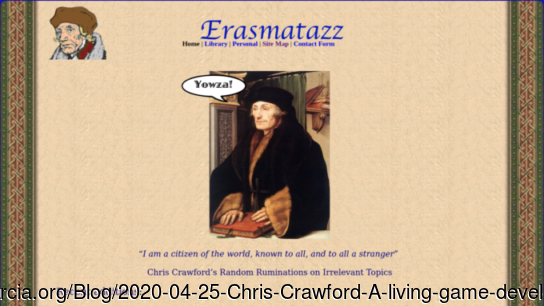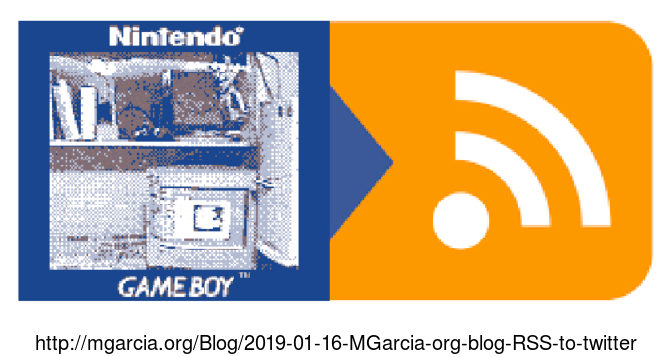Chris Crawford A living game developer GOD
April 25, 2020, at 05:35 AM (0 comments)
Title: Chris Crawford A living game developer GOD Author: mgarcia Date: 2020-04-25 05:35 +0200 Tags: 2020, Industry, Friends, Pics, GameDev, Blog Comments: Open

The Journal of Computer Game Design
I've had random people tell me, that the old stuff is irrelevant. This just made me laugh, I find the old writings, talks and education way more valuable then the new current stuff, kind of off topic, so see rant below.
I've put a pause on my reading of Game Developer magazine archives, to read Chris Crawford's The Journal of Computer Game Design, it has a lot of insight on the game development industry back then, but some articles are still very much relevant, if you don't believe me, here is just one article.
For game development students, I recommend starting with this, it's timeless advice: The Education of a Game Designer.
And if you're interesting in the publishing business, I can recommend:
Through Hope-Colored Glasses: A Publisher's Perspective on Game Development, by Don L. Daglow
But whatever your background and interests are, the following article was really really really good and very much relevant to any time period.
EndPage: Late Night Ruminations on the Game Designer’s Life
Source: "Article by Chris Crawford, from issue August/September 1987."
I am sometimes told by acquaintances, “Gee, I sure wish I could be a game designer. What fun it must be!” Most of the time I just smile and say, yup, it’s fun. I seldom bother to tell them what it’s really like to design games for a living.
There’s the delight and curse of being in absolute control of my own time. Every aspect of my schedule is under my direct control. The only real time constraint on me is a contractual obligation to deliver a finished game ten or twelve months from signature. Otherwise, I am free. If I don’t feel like working one day, I don’t have to. If in the middle of the day, I feel like taking a long lunch, or just going for a walk, I can. I can take a vacation whenever I want, for as long as I want.
The curse of this is the ever-present sense of responsibility. I cannot take a moment off without feeling some pang of guilt that I am not working my best. The employee can tell himself, ‘I earned this vacation, and I will enjoy it!’ I will never be able to say that to myself; every minute of relaxation is a minute stolen from the project. Under these circumstances, relaxation becomes something that is doled out in carefully rationed amounts. I relax just enough to keep my sanity, just enough to refresh myself for the next round of work. In three years, my longest vacation has been three days in Yosemite.
Another duality of freelancing comes from the creative control it offers. The good side of this is the opportunity it provides for me to do my very best work. I don’t have my efforts watered down by the mediocrity of a large organization. I don’t have to waste my time sitting in meetings, or explaining my decisions to some uncomprehending dork three departments away, or hassling the various bureaucratic problems of The Organization. I am vastly more productive now than at anytime in my life.
But the price I pay for this comes late at night, when I lay awake wondering about the decisions I must make on the morrow. There’s no fatherly boss down the hall to take my uncertainties to. There’s no friendly coworker in the next office to bounce ideas off of. There’s no gang around the water cooler to trade banter with. I’m all alone. The decisions I make weigh on me, and there is nobody to share the burden.
Finances? They’re a roller coaster. Five years ago I had a hit, and I was rich. Three years ago the industry collapsed, and I was poor. Only the fact that we had saved much of the money from the good days saved us. Now I have a hit again, and again I am rich. But who knows when the royalties will dry up? Who knows whether this next game will be a hit or a failure? I save my money and work my butt off, hoping fervently that hard work and talent can stave off bankruptcy. So far, it’s worked.
It’s not fun, not in the way most people imagine. I don’t sit in front of the computer laughing and giggling as I assemble an array of cute tricks to tickle your ribs. It’s hard, grinding work, trying out things that don’t work, then trying more things that don’t work, until finally I try something that does work. I scowl at the screen a lot. Towards the end of every project, I become an ugly person. My temper grows short. I yell at my wife. My body starts to screw up in a dozen ways. I hate the project and I hate myself. My grip on reality weakens. No, it’s not fun.
What is fun is the deep satisfaction that comes from creation. It’s not an immediate sense of gratification I get from putting together some cute bit of code or some nice feature. No, the true joy of this job comes a few months after I have stamped out the last bug in a cold fury of desperate, behind-schedule bug-fixing. I shoot the last disk off with an angry or exhausted cover letter and joyfully turn away from the project that has ruined my life for so long. And then one day months later, a delivery truck comes down my driveway with a box that has my game in it. With trembling fingers I tear open the box and there sits my game. So beautiful it is! I turn the box over and over in my hands, savoring every detail. Inside is the rules manual and the disk. It all looks so wonderful, so professional, so perfect. I mount the box in a frame and proudly hang it on my wall with my other creations. Only then, months after I have finished work on a game, can I appreciate it.
Later still, when I can look back from a distance and see what I have made, I can weigh the creative agony against the joy of creation, and say, “It was worth it.”
END OF ARTICLE
What's the average age of your information creators?
Warning, below is a bit of a rant!
If you think about it, it's not hard to be exposed to today's common denominator, generic, 'internet wisdom', advice! It's low quality with no nuance, the internet in general, assumes everyone is the same stupid noob, and I liken it to the "teenager years", where they know better then everyone else, but strangely unaware of their own "dunning kruger".
I guess if you have in your pocket a super computer connected to the worlds largest information database and take it for granted, then it's inevitable, normalized degeneracy will happen.
That's just how the internet is now and in my opinion, getting worse as the average age of the internet user and content creators lowers. In my 20's, in the mid 1990's I would have guessed the average was mid 30's or mid 40's, it was fairly technical and niche just getting online, up to about the early 2000's where the modems were a thing of the past in most households. But even then, in the 2000's I would have guessed the average age wouldn't have lowered that much, it was still very technical to publish anything online.
In the 2010's the technical hurdle of publishing was removed thanks to hive sites (social media), and adding to the rise of smart phones and you have an ever lowing age of audience, content and advice on the internet.
Now I would guess the current average age of the internet user would be close to 17 years old, with children app's (ie Snapchat) becoming more and more popular, this is the trend.
Unfortunately, as more parents give their toddlers internet connected devices, it bring the whole internet down with it, with more and more censorship.
So where is the internet for adults?
Where is the information from previous generations?
It's much harder to come by, it's on books, VHS, CDROM, tapes, archive.org, etc.
The people that toiled over bytes and CPU cycles?
The stories of how the world changed, for better or worse?
I used to call Dino Dini a game dev veteran, but I changed my mind and said to him the follow:
I now call developers from the 1970's as gods, developers from the 1980's as ancients, and the 1990's developers as veterans. All holders of some kind of ancient wisdom and mystical stories! It's kinda silly, but that's how I see it and believe it.
It'll be a sad day when the gods and ancients are no longer here to talk or write! I think as followers of these people, it's our role to spread their ancient wisdom.
Update 25th April: Chris is running a new course!
The course will operate on a weekly cycle. Students will read the assigned material, and once a week we will meet by Internet video for one hour to discuss the material. This video meeting will NOT be a lecture on my part; the students are expected to bring their questions and arguments to the meeting so that we can INTERACT. To facilitate interaction, each section of the course will be limited in size. I believe that the ideal size is about seven to ten students.
The course will extend over fifteen weeks.
http://www.erasmatazz.com/2020-course.html



